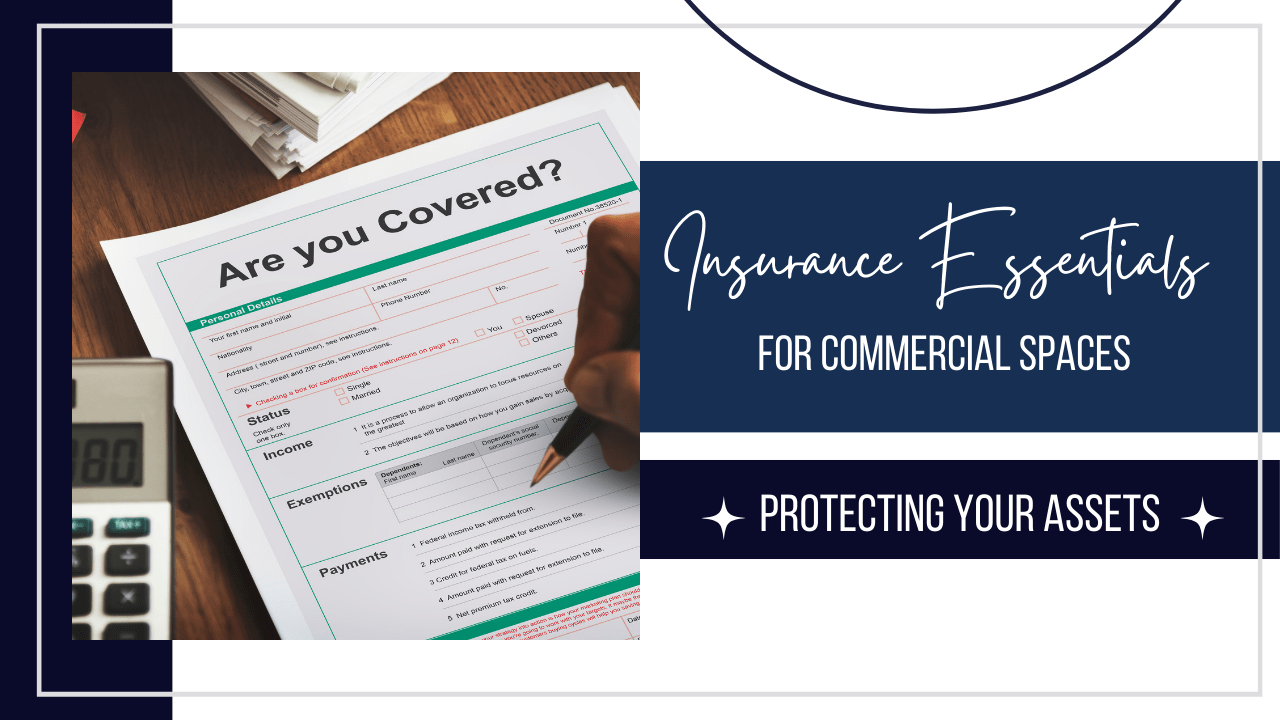Investing in Southern California commercial real estate is a desirable business venture for many real estate investors because of the income potential in both the short and long terms. However, in order to succeed, you have to make sure you’re doing everything you can to protect your investment.
You’re responsible for securing your investments and ensuring that you are prepared for any eventuality or even a potential catastrophe.
It’s nearly impossible to do that all on your own. You need an experienced Southern California commercial property management partner. You also need comprehensive insurance.
You need the right insurance coverage for your commercial spaces. What kind of insurance? How much is enough? How will you know that everything is covered?
At Bell Properties, we’re commercial property managers in Southern California who have led investors through the process of obtaining insurance, evaluating insurance, and protecting their investment properties in the best ways that they can. Let’s talk about the insurance coverage you should consider for your property to protect your assets.
The California Department of Insurance has a detailed guide on their website (www.insurance.ca.gov), which we think is a pretty handy resource. That’s a good place to find any answers that you might need, and it’s also a good place to become completely overwhelmed because of the volume of information you’re likely to find there.
Here are some of the highlights we want to make sure you don’t miss.
Property Insurance for Commercial Investors in California
You’ll find just about anyone in commercial real estate is willing to debate whether property insurance or liability insurance are more important. Bell Properties likes to believe they’re equally important. But, we’ll start with property insurance since that reflects the needs of your physical structure.
Property insurance will cover damage or loss to your building and its contents caused by storms, fires, theft, and other unpredictable events. It's important to be aware that basic property insurance coverage doesn't always cover natural disasters like earthquakes and floods, which are common threats in California. You may need to purchase additional coverage if you're located in a high-risk area.
There shouldn’t be a hard sell required for you to buy as much property insurance as you can afford. Think about the protection it provides for your property. If a fire or storm wipes out walls and roofs at your building, destroys part of the property, or destroys any of the equipment or inventory you might keep at the building yourself, you can’t make money. Your commercial tenants can’t, either.
In a catastrophic event, you’re shut down until you can make repairs and make your property safe again. Insurance coverage for your business property gets you back up and running faster and without financially ruining you or your tenants.
Two important things are covered by commercial property insurance:
Your Building
Your Income
The physical building that you are renting out to tenants is covered from theft, vandalism, fire, lightning, windstorm, or other named perils. Coverage also typically applies to permanently installed fixtures, machinery, or equipment.
Sometimes referred to as business interruption coverage, business income for you is the rent that your commercial tenants pay. You’ll need insurance to ensure that you don’t suffer a freeze in your cash flow when there’s a problem.
As Southern California commercial property managers, Bell Properties always wants to talk about earthquake insurance. Flood insurance is a big help in achieving peace of mind, too. Consider it for your investment property. Buying earthquake insurance and flood insurance protects you and your assets against loss. You’ll get coverage for:
Buildings and physical structures
Business personal property that you might have at the commercial space you rent out
Loss of business income if tenants cannot pay rent
Earthquake sprinkler leakage
Betterment or repairs required by local ordinance or law after the quake or flood
As we mentioned, most commercial property coverage does not usually include damages caused by floods. In California, heavy downpours can be catastrophic, and other natural catastrophes can occur without warning, causing severe damage to commercial properties. It's essential to get flood insurance if your commercial property is located in a flood-prone area to secure your investment.
Depending on the specific needs of the risk, you may have additional peril coverage available that can help you get the most comprehensive plan available for your commercial rental property.
Liability Insurance for Southern California Commercial Properties
General liability insurance is extremely important for just about every business, including your business as a commercial property owner. Liability insurance is another essential coverage that every commercial property owner must include in their toolbox of property protections. This type of insurance covers your legal responsibility for property damage, personal injury, and other accidents that can occur on your property.
It's important to remember that you can be held liable for accidents and injuries that happen on your premises, even if you're not directly responsible. Liability insurance will ensure that you're covered if a lawsuit is filed against you.
What is the difference between professional liability and general liability? This is a question we get a lot at Bell Properties. Remember that we aren’t insurance agents; we’re Southern California property managers. However, we can tell you that general liability is an insurance policy that covers physical risks, such as bodily injuries and property damage. Professional liability insurance covers more abstract risks, such as errors and omissions in the services your business provides.
General liability is where you want to have most of your coverage. If you’re worried about potential business lawsuits or claims based on how you handle those client relationships and the work you do, professional liability is something to consider. Just make sure you have as much general liability as possible in case you’re called to defend yourself in court.
Business Interruption Insurance for Commercial Real Estate Investors
In case of unexpected disasters, such as fires, storms or other natural calamities, your business operations may be halted, even for a temporary period. If your tenants are unable to continue doing business from their space within your commercial property, you might find yourself unable to collect rent from them. This may cause significant business losses.
Business interruption insurance coverage ensures that your income will not be negatively impacted if your business cannot operate after damage to the property.
Most policies of this sort will require a suspension of operations, which for most owners means a temporary, but complete, end to whatever delivers your income. You won’t be able to file a claim if rent is late or only partially paid. There’s no coverage for a slowdown of income or reduction in operations. You’ll have to show why no rent is coming in.
The most common reason that commercial property owners file business interruption claims is fire or total property damage.
Commercial property insurance policies often cover the losses that owners sustain from a lack of business income. Coverage should include the time it takes to rebuild, repair, or replace your commercial rental operations with the exercise of due diligence, or up to a specified period of time.
Your Commercial Tenants and Their Insurance
 You can require commercial lease insurance when your tenants move into your Southern California commercial property. This is important; you don’t want to shoulder all of the financial risk and legal liability yourself. Standard requirements for most commercial leases include the following:
You can require commercial lease insurance when your tenants move into your Southern California commercial property. This is important; you don’t want to shoulder all of the financial risk and legal liability yourself. Standard requirements for most commercial leases include the following:
General liability. This protects you and it also protects your tenant if someone gets injured while doing business in their rental space.
Commercial property insurance. If your tenant’s expensive electronic equipment or industrial machinery is stolen or damaged during a covered loss, you want them to be able to repair or replace it. You don’t want your tenants needing to close up shop or cease business operations; it means no rent for you.
Workers compensation insurance. This is coverage that pays for employee medical bills and lost wages that result from a workplace-related injury or illness. Why should you care if your tenants carry it? Because if they don’t, those employees could sue your tenant directly, and that would either put them out of business or make it more difficult for them to pay rent.
Write insurance requirements into your lease agreement to ensure you’re protected, your tenants are protected, and your property is protected.
As a commercial property owner in California, it's crucial to have comprehensive insurance coverage to protect your assets from unpredictable circumstances. The insurance coverage we discussed above is essential to protecting your investment.
Talk to your insurance agent in order to get some specific recommendations that are especially geared towards you and your space. This is all general information, which pertains to any commercial property owner, but the nature of your building and the business that is done there may require extras.
We’d be happy to help you make some decisions and work through the coverage that will benefit you most. When you need some Southern California commercial property management support, contact us at Bell Properties Commercial Real Estate.



